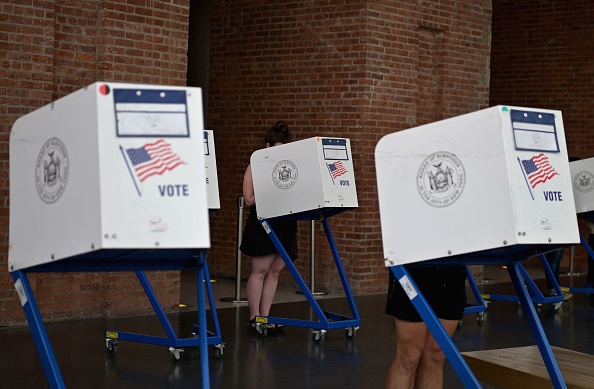We’re less than three weeks until Election Day and early voting has begun in many states. But according to a few recent polls, voters are already skeptical about the results.
On Wednesday, the Associated Press released a poll conducted with the NORC Center for Public Affairs Research finding that only about half of the Americans polled had high confidence in the midterm elections — an improvement, but not a huge one, from 4 in 10 right before the 2020 election, which was preceded by ample talk about the dangers of mail-in voting.
The AP poll also found that a whopping 58% of Republicans surveyed still believe that Biden’s presidency is illegitimate, slightly down from 66% from July 2021.
The day before, the New York Times released a similar poll finding that 28% of all voters, including 41% of Republicans, said they had “little to no faith” in the accuracy of the upcoming midterm election results. In general, 71% of all voters polled said they believed that democracy was at risk.
When taking the long view, this pattern shouldn’t come as a surprise, given that former President Donald Trump has devoted the past two years to sowing seeds of distrust. What we’re seeing now are the buds of election chaos, preparing to bloom at some point between now and November 2024.
Voters’ distrust of the system is being bolstered by the candidates themselves, just like in 2020: As we noted earlier this week, 12 Republican candidates in high-profile races across the country have either stated that they won’t accept the results of their elections if they lose or refused to clarify where they stood, in soft advocation for the Big Lie. There are also nearly 300 Republicans on the ballot this year who have denied the results of the 2020 election, a Washington Post analysis found.
“I think what it reflects is free-floating skepticism, paranoia and conspiracy theories about elections, none of which are rooted in any kind of reality, and none of which are responsive to whatever election rules are passed or not,” Nicholas Stephanopoulos, an election law professor at Harvard University, told TPM.
Stephanopoulos found it ironic that Republicans and their base are still unconvinced that elections can be conducted fairly and securely, considering they spent the past few years passing new election rules to ensure of that.
At least 33 new restrictive voting laws that have been enacted in 20 states since January 1, 2021. Lawmakers in 39 states have also proposed 405 restrictive bills during this year’s legislative session alone, according to the Brennan Center at NYU. But these new laws aren’t enough to quell talk of election malfeasance by top Republicans: The Texas secretary of state’s office, for example, recently announced that they will send “inspectors” to observe vote counting in Harris County, the state’s largest district, home to Houston, and a Democratic stronghold. Meanwhile, there’s been no evidence to suggest that widespread voter fraud will affect the general election.
While 2020’s was conducted in unprecedented circumstances — a global pandemic — election administrators this year are facing another unprecedented challenge: a wave of attacks fueled by conspiracy theories about their work. Activists have attacked election workers, leading to many high-ranking officials to leave their positions.
“I am confident that, even facing some serious challenges, election officials will count the votes accurately,” Alex Tausanovitch, director of campaign finance and electoral reform at the Center for American Progress, told TPM. “What I’m concerned about is that people will attack the results.”
Since the 2020 election, there have also been incidents of disgruntled right-wingers filing bogus lawsuits, flooding election offices with records requests, and spreading fresh misinformation and conspiracy theories ahead of Election Day.
“The problem is that over time, that conduct, combined with electing people who don’t believe in our elections, lays the foundation for a future in which we could have elections that are genuinely overturned,” Tausanovitch said.
Kyle Kondik, managing editor of Sabato’s Crystal Ball at the University of Virginia, worries that conspiracy theories will again run rampant this year after the election. “The fact that we have election results that take a few days or weeks to finalize, that sort of space between election night and reporting the results can be filled with conspiracist thinking.”
“The broad trend in American life is distrust of all sorts of different institutions,” he told TPM, “so this is kind of part and parcel of what you see in other walks of life.”
This pattern, in fact, doesn’t just apply to how elections are run: A Pew Research study released in June found that Americans’ trust in the government has reached historic lows, with only 20% of those polled saying they trust Washington to do the right thing “just about always” or “most of the time.” 68% of those polled said they believed that most candidates run for office “to serve their own personal interests.”
While Trump’s rhetoric fueled the distrust, Kondik says, “it may just reflect the sore loser mentality, where people are looking for excuses other than that they just got fewer votes.”










